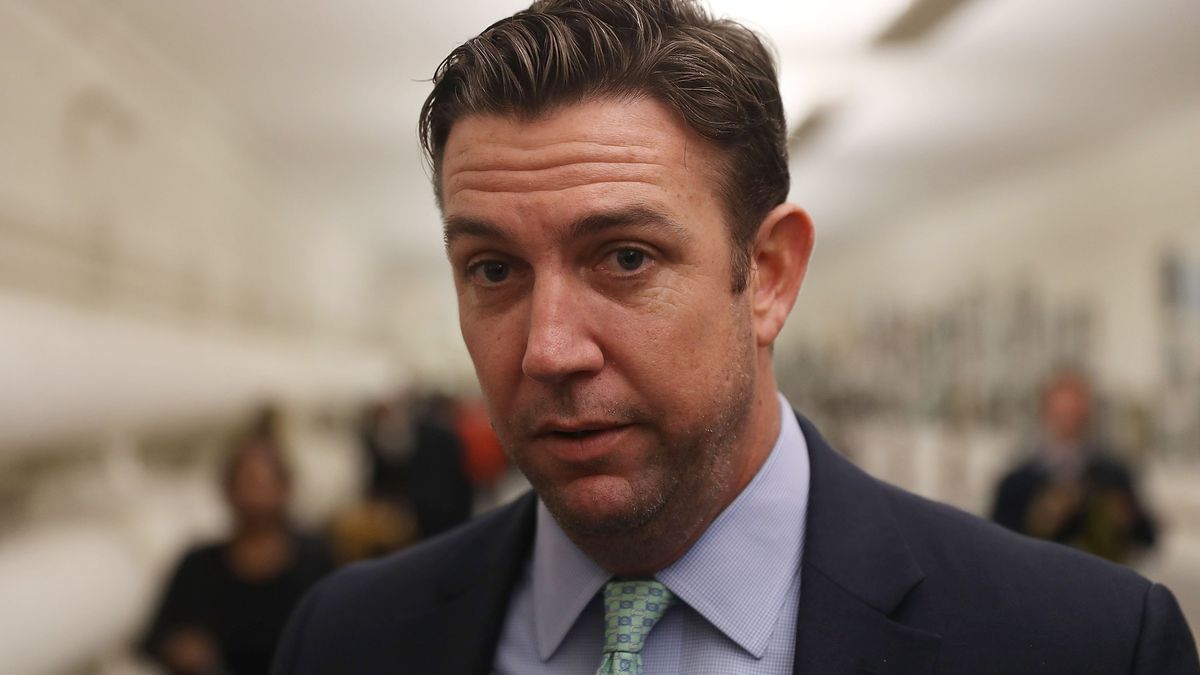Twenty House Republicans Donated to Duncan Hunter's Islamophobic Campaign
Rep. Hunter falsely painted his Mexican-Palestinian American opponent as an infiltrator with ties to terrorists. But prominent House Republicans continued to back his campaign with big donations.

After years of statements that either hinged on or directly implicated Iowa Rep. Steve King as a supporter of white supremacy, House Republicans passed a resolution condemning King following a recent interview where he questioned why using the terms “white nationalist” and “white supremacist” was offensive.
Republicans like House Minority Leader Kevin McCarthy claim past leadership did not take King’s racism seriously, but McCarthy was in fact in charge of messaging for the party and asked reporters privately “to ignore King’s crazy racist rantings.” And despite years of objectionable statements, King also served as the co-chair for Ted Cruz’s 2016 Presidential campaign.
While the national GOP leadership finally decided to take action on King this week, other members of their caucus with similar histories of racist and offensive statements have not been condemned and in fact receive financial support from their Republican colleagues.
The most prominent example from the last election cycle is Congressman Duncan Hunter’s Islamophobic campaign for California’s 50th Congressional District.
After the Depart of Justice released a full 47-page indictment in August implicating Hunter in illegal campaign finance spending, Hunter’s lead began to slip in the polls. So with weeks left before the election, Hunter decided to try a new tactic: tying his opponent, who happens to be a Mexican-Palestinian man, with terrorism.
Running against Democrat Ammar Campa-Najjar, a former White House staffer during the Obama administration, Hunter began spending thousands of dollars on Facebook advertisements against his opponent. His statements and videos were blunt: they painted Campa-Najjar as a “national security risk” with family ties to terrorism who was “working to infiltrate Congress.” Campa-Najjar’s grandfather was involved in the 1972 Munich terror attacks, but Campa-Najjar never met his grandfather, who died 16 years before he was born. And perhaps mostly irrelevant to the situation, but something Hunter disputes without evidence, Campa-Najjar is a Christian.
The ads argued that if Campa-Najjar received classified information, he would expose our interests abroad. Hunter’s advertisements did not provide actual critiques of Campa-Najjar’s platform or policy ideas. Rather, Hunter was trying to argue that Campa-Najjar was Muslim, and by proxy dangerous. Politifact called a claim made in Hunter’s ad that Campa-Najjar was supported by the Council on American-Islamic Relations and the Muslim Brotherhood “an unsubstantiated accusation that rests on fear-mongering.”

Although it was the closest election in the district’s recent history, Hunter ultimately won re-election with 51.7 percent of the vote to Campa-Najjar’s 48.3.
Despite his viciously racist and Islamophobic campaign rhetoric, Hunter’s campaign pulled in thousands in donations from fellow Republican lawmakers. A Sludge analysis of post-election campaign finance reports found that 20 current and former elected officials, all Republicans, made contributions to Hunter’s campaign from their leadership PACs or their campaign committees, for a total of $56,700.
Of the elected officials from the House whose campaigns and PACs made donations, seven are retired: Brian Bilbray (R-Ca.), Dan Burton (R-Ind.), Tim Murphy (R-Pa.), Todd Akin (R-Mo.), John Kline (R-Minn.), John L Mica (R-Fla.), and Buck McKeon (R-Ca.), who Sludge found may be using his old campaign funds to help his current lobbying clients.
The other thirteen were in office at the time of the contributions or are still in office, including Adam Kinzinger (R-Ill.), Bill Shuster (R-Pa.), Brett Guthrie (R-Ky.), Darrell Issa (R-Ca.), Don Young (R-Alaska), Joe Wilson (R-S.C.), Lamar Smith (R-Texas), Roger Wicker (R-Miss.), Roy Blunt (R-Miss.), Sam Graves (R-Mo.), Scott W Taylor (R-Va.), Tom Cole (R-Okla.), and Tom Rooney (R-Fla.).
Apart from current and former House representatives, former Arkansas governor and presidential candidate Mike Huckabee, the father of current White House Press Secretary Sarah Huckabee Sanders, also contributed $5,000 through his leadership PAC, Huck PAC.
“Elected officials more than anyone know what kinds of events they’re going to, who they’re donating to, and what’s going on politically,” said Professor Robert McKenzie, an adjunct at Columbia University and the founding director of the Muslim diaspora initiative at New America, a non-partisan think-tank.
“Apparently his remarks did not sway their interest in trying to get them elected. It’s pretty toxic stuff. If Huckabee and folks at that level are willing to support someone like this, what does that signal to other folks running for office?”
Hunter’s framing of Campa-Najjar is what UC Berkeley Prof. Ian Haney López calls a racially motivated dog-whistle. In his book,“Dog Whistle Politics,” Haney López argues that this tactic requires three basic moves: a thinly-veiled racist reference to a non-white population, disputing that the comment was a direct reference to that group, and then criticizing anyone who called them out on what they said. Hunter’s behavior fits that mold.
“Honestly I never took him seriously. Especially after the whole indictment situation,” said Sarah Farouq, a student at UC Berkeley who has lived in Hunter’s district for the past past 8 years.
Farouq is also a former organizer for Pillars of the Community, a social justice focused Muslim community organization. As Hunter’s constituent, she said that she only noticed Hunter’s language change when his campaign was in trouble.
“Being Islamophobic? Targeting specific populations of his own district?” “It sounds like more of a tactic.”
The narrative is typically that in using dog whistles and racist attacks candidates act alone and without party support. Former Speaker Paul Ryan, for example, has lambasted President Trump’s language, saying that in 2016, he made the “textbook definition of a racist comment.” And while he didn’t strip him of committee assignments, he has openly rebuked white supremacist statements from Iowa Rep. Steve King.
In 2018, The Congressional Leadership Fund, a super PAC affiliated with Ryan, and the National Republican Campaign Congressional Committee, asked in advertisements if Rhodes Scholar Rep. Anthony Delgado (D-N.Y.), a black candidate with a brief rap career, was right for the district. The ads were criticized as race-baiting in a district that is 90 percent white. And while Ryan had the ability to push for the censorship and removal of King from Congress, he never took the extra step.
Hunter’s father, who held the same congressional seat before him, was also no stranger to this sort of language. His chief achievement, as he often described during his campaign, was pushing legislation that appropriated funds for the San Diego-Mexico border fence. And he talked about it often.
In his book, Haney López argues that after 2001, “racial demagogues increasingly emphasized supposed threats from Arab Muslims as terrorists and Latinos as illegal aliens,” the two demographics emphasized by both Duncan Hunter Sr. and Duncan Hunter Jr.
On the way out as Chairman of the Armed Services Committee in 2008, after it was clear that Democrats would retake the House, Duncan Hunter Sr. decided to make a dark-horse run for the Republican presidential nomination against John McCain. His short presidential campaign was characterized by familiar policy ideas, most notably fierce support for border fence expansion, which he said would stop North Koreans, Iranians, and Chinese individuals from crossing the Mexican border, and his suggestion that if nuclear weapons were found in Iraq, he would have the U.S. military launch a preemptive nuclear strike.
Hunter Sr. withdrew early in the primary, and when it came time to retire in 2008, his son ran for election and took over the 50th District.
Apart from the advertisements, a few months before the election, Hunter Jr. was recorded at a winery arguing that Campa-Najjar is one example of an Islamophobic conspiracy theory.
“That is how hard, by the way, that the radical Muslims are trying to infiltrate the U.S. government. You had more Islamists run for office this year at the federal level than ever before in U.S. history.”
Hunter Jr. never apologized, and his campaign critiqued those who argued that Hunter is being Islamophobic or racist.
McKenzie told Sludge that the impact of this type of rhetoric, coupled with a rise in terrorist attacks since 9/11, has prompted a significant spike in hate-motivated attacks against Muslims around the U.S since 2015. McKenzie was able to track at least 763 separate incidents since 2012 of violence toward Muslims in the U.S. More recently, he conducted a national survey of American opinions toward Muslims: he found that 23 percent of Americans nationwide believe that Muslim-Americans have sympathy for jihadist attacks. Sixty percent americans believe that muslims want to integrate into society, but 40 percent believe that they do not.
“Whether you’re talking about Hunter or someone else, it’s hard to use that rhetoric if you don’t think it’s going to connect,” said McKenzie. “Regrettably, there’s just a lot of disinformation around Muslim Americans.”
When asked about his son’s campaign in October, the elder Hunter made his thoughts apparent. Despite a lack of evidence, his comments were in line with those made by his son and his own past rhetoric, as well with Haney-Lopez’s definition of a racially motivated dog-whistle.
“This has nothing to do with race,” Hunter Sr. told reporters. “This has to do with terrorism.”
CORRECTION: This article originally said the final vote count was 52.5% to 47.5% when it was in fact 51.7% to 48.3%.
Related:




Comments ()